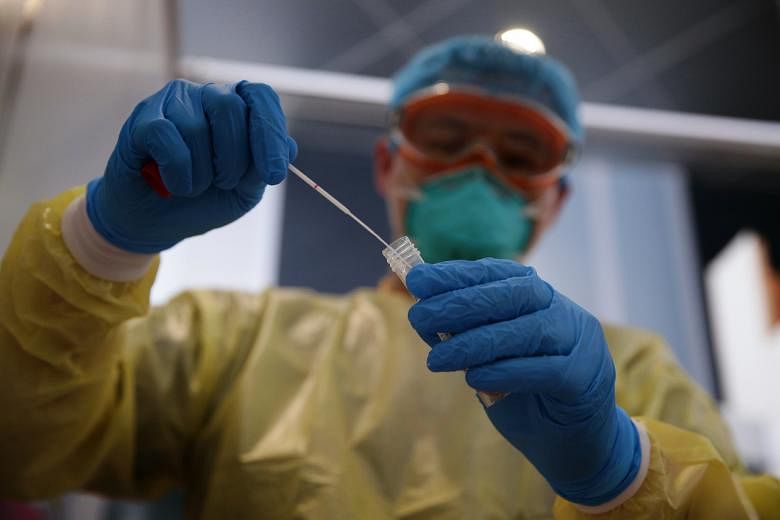A nationwide Covid-19 testing strategy is being developed, even as Singapore scales up its testing capacity, said Minister for National Development Lawrence Wong.
This will involve more extensive community surveillance to better detect any unlinked cases in the community, he said in a ministerial statement on the virus yesterday.
"We will also prioritise the testing of higher-risk and more vulnerable groups, like residents and staff of nursing homes and welfare homes, as well as healthcare workers that have high touch points with the community.
"And then, we will progressively expand testing to the rest of the essential workforce and the broader community, in line with the expansion of our testing capacity."
Health Minister Gan Kim Yong said, in response to Workers' Party chief (WP) Pritam Singh (Aljunied GRC), that there have been several constraints on Singapore's testing capacity that prevented more widespread testing earlier on.
One constraint was the limited availability of test kits, said Mr Gan, who co-chairs the multi-ministry task force fighting the coronavirus pandemic with Mr Wong.
Mr Gan said: "We will need to look at how we can source for more test kits, both manufacturing locally as well as procuring internationally, to allow us to have more capacity to do so.
"At the same time, we are also looking at materials (required) for the testing, such as the reagents that will be needed for the extraction of the RNA materials."
He said Singapore is trying its best to scale up its testing capacity from the current 8,000 tests daily to about 40,000 as quickly as possible, but also noted that there is a global shortage of test kits and the materials required to conduct the tests.
"We have to ensure that we have a continued supply and stock of these materials to allow us to continue and sustain this high level of testing," said Mr Gan.
Another constraint lies in the manpower needed to carry out swabbing on patients, as well as for processing, documenting and testing the samples and recording the results, Mr Gan said.
"All this requires laboratory capacity. So there are infrastructure and manpower requirements at every stage of the test."
WP Non-Constituency MP Leon Perera asked if the Health Ministry is looking into testing sewage for the coronavirus as the authorities in Switzerland and Australia are doing.
He also asked when the ministry expects a vaccine to be ready.
In response, Mr Gan said trials are being conducted here to see if the virus can be detected in sewage.
But there are challenges in doing so, given that any viruses in sewage collected from a large population would be "significantly diluted".
It may be possible to test sewage for the virus in places with high concentrations of infection, said Mr Gan, but he also noted that cases in such settings would likely be detected even without these tests.
"(Sewage testing) is something that we are continuing to study and see whether we can deploy it in a meaningful way," he said.
On the search for a vaccine, the minister said it is "still very early days" even though some progress has been made.
"From here to testing to eventually being approved for use by a population, I think we are still some way off," he said.
"We can't count on the vaccine to solve our immediate challenges of infection cases in the community."
Ms Cheryl Chan (Fengshan) asked what can be done to help patients who are clinically well but cannot be discharged as they continue to test positive.
In response, Mr Gan said one limitation of the test kits is that they cannot determine if a positive sample contains viable viruses or not.
He said some patients may continue to test positive for months despite not being infectious as they may be carrying only virus "fragments" that are no longer viable.
"We need to think about what we can do to help them so that they can be discharged, go home and go back to normal life if they are no longer infectious," he said.
"This is something we are looking at and discussing with the infectious disease experts community."












